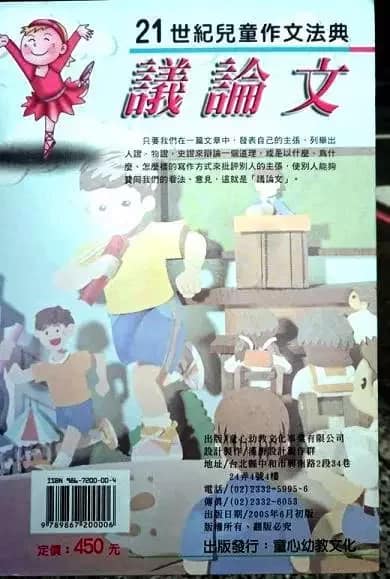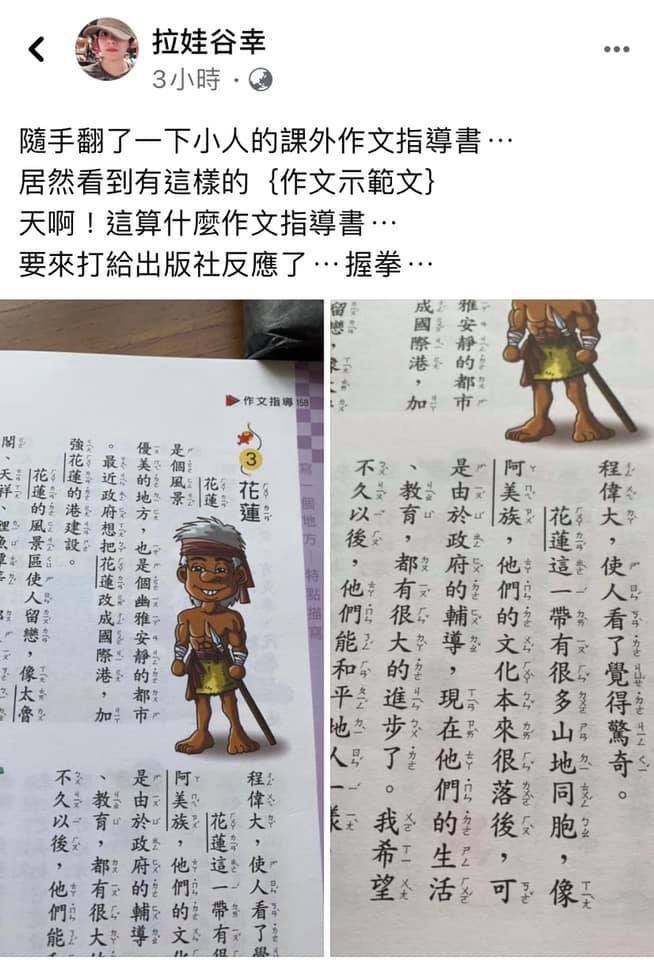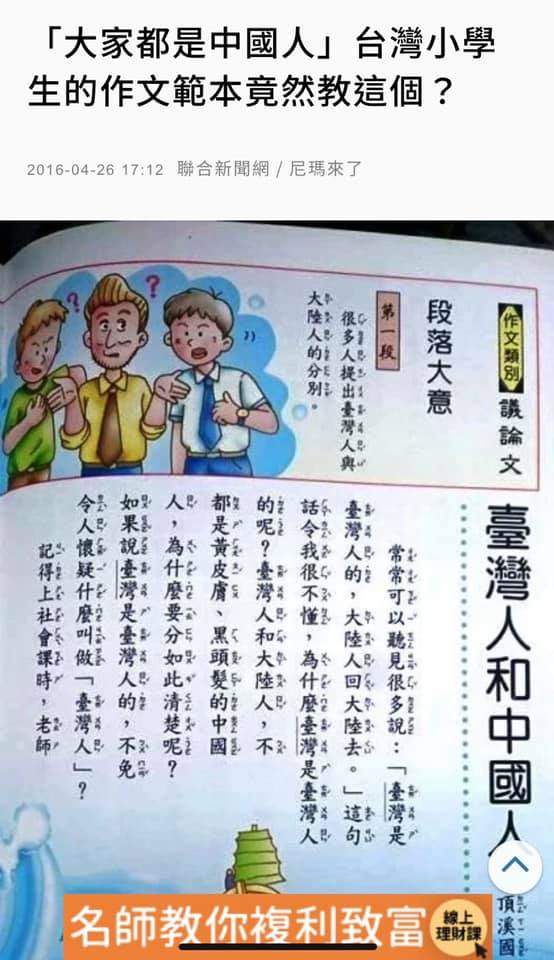A few days ago, news broke that some "supplementary textbooks" available in many Taiwanese schools were full of racist depictions of Indigenous Taiwanese as well as pro-China, anti-sovereignty propaganda. The books themselves had been published in 2008, which feels like a lifetime ago in terms of evolving social consciousness in Taiwan. The problem was that these texts were still hanging around in classrooms, offering up all sorts of garbage to students. They're even touted, in some cases, as having "model essays" for young students to study and, I suppose, imitate.
Here are the examples being shared on social media. I saw them from Saidai /Reseres 伍麗華 (Saidai Tahovecahe), the first DPP legislator representing the Highland Indigenous Constituency in the legislature, and was elected in 2020, but she's not nearly the only person sharing them.
I am not a translator, so please don't take my translations as the final word. However, I think it's important to clarify exactly how awful these 'supplementary textbooks' are, and what one Indigenous reaction to them looks like.
The one with the racist cartoon of an Indigenous Taiwanese says something like:
Hualien has many 'mountain compatriots' (an old-timey, racist and very ROC/China-centric way of describing Indigenous people who had not assimilated into Han society), their culture used to be very backward, but owing to the government's guidance, their lives and education have all developed very much. I hope that in the near future, they can be just like the 'plains people' (Han Chinese and Indigenous who have assimilated).
It's obvious why this is racist, and not up for debate. In the words of Sifo Lakaw (the 2nd link above):
怎麼這麼不小心,就這樣洩漏了你們內心裡根深蒂固的種族優越感?你們說「壯志飢餐胡虜肉,笑談渴飲匈奴血」的是民族英雄;戍守傳統領域的原住民族是野蠻人,需要被教化的對象。當我進入到蔑視和否定其他文化的教育體系,我一度相信這是邁向成功的道路,認為自己的語言和文化是不符合時代潮流,沒有競爭力的。
一直到從長輩的口中,聽見他們使用優雅且善用隱喻風格的族語,時而幽默,時而歌唱地描述外來者的貪婪,以及彼此猜忌與嫉妒的性格時,也才真正的發現,那些自居高尚的人,其內心是多麼地醜陋而險惡。既然事實已澄清,那就好好開始學習自己的語言和文化,期許自己和下一代成為真正的人,不被種族主義者擊垮。
How can you be so careless as to show the world the deep sense of racial superiority you carry inside? You say that (reference to an ancient poem related to people who follow Confucian ideals -- honestly this is beyond my ability to translate, and the original is quite gory) are national heroes; the native peoples who adhere to tradition are barbarians and need to be guided. When I started school, which denigrated and rejected other cultures, I once believed that this was the path to success, thinking that my own language and culture were inconsistent with the times and adhering to them wouldn't lead to success.
It was not until I heard the language of the elders -- metaphorical, humorous, lyrical -- describing the greed of the outsiders and the suspicion and envy between them, that I saw they were only out for themselves. How greedy and sinister the hearts of these 'noblemen' were. Now that we know the truth, it's time to start learning your own language and culture and expect yourself and the next generation to become actualized, not beaten down by racists.
The second one, which has some confused white people cartoons (I don't know why either) is titled "Many people put forward that Taiwanese and Mainlanders are different" and says something like:
You can hear a lot about how "Taiwan is for Taiwanese, people from the Mainland should go back to the Mainland." I don't understand this kind of talk, why should Taiwan be for the Taiwanese? Taiwanese and Mainlanders have yellow skin and black hair, are they not all Chinese, why must they be divided up so clearly? If you say "Taiwan is Taiwanese", it will unavoidably stir up suspicion about what is called 'Taiwanese'.
I suppose the confused white people were put there to imply that it's foreigners who are trying to 'divide' the Chinese by talking about Taiwaneseness as a distinct identity, not Taiwanese themselves. This is a racist lie. It's only believable if you think Taiwanese people are empty-headed enough to believe random foreigners telling them about their culture, which I certainly hope you do not. Taiwanese identity came from Taiwan, period.
However, I see an ironic truth in the cartoon: this flummoxing text caused me to sympathize with the dude in the center -- the one with all the question marks.
If you think that these examples of "supplementary texts" are egregious but rare (both in how horrible and common they are), that is wrong.
They are terrifyingly common: I don't think I have a single local friend or student whom I've asked who doesn't remember these sorts of books from school. They may be allowed into schools by the Ministry of Education, but they are developed and distributed by private entities, mostly special interest groups trying to influence what students learn in school. This article details "extra-curricular" lessons taught by both LGBTQ allies and anti-gay conservatives, and mentions the materials they use. Religious indoctrination happens, too.
While I might personally support the use of LGBTQ-allied material to make up for any shortfalls in the official textbooks, if the other side of that is allowing anti-gay content into schools, it's probably better that no 'supplementary textbooks' by any special interest group be allowed in. Or if they are, there must be a more rigorous materials assessment process before approval.
Although I'm having trouble finding the specific articles I read a few years ago that cited 'supplementary textbooks' and their role in the fight for LGBTQ and marriage equality, I have a more terrifying, more personal story which should illustrate how sure I am that 'supplementary' materials on all topics are not only common in Taiwanese schools, but the way they spread their message has become more sophisticated.
For reasons I cannot disclose, I had the opportunity to look at one such book aimed at elementary school classrooms (I did not assist in any element of its conception or production). I cannot tell you who it was developed by, but I can say that the foundation funding it is politically neutral itself, but the titular head of that foundation is not. This person was convinced that Taiwanese children had 'forgotten' the importance of respect for one's elders and other traditional 'Chinese' ideals. To put it bluntly, I disagree not just on the opinion but the worldview underpinning it, but that's not the point.
The content was fairly innocuous on the surface, although I'm not at liberty to go into too much detail. It included a few 'folk tales' meant to teach children the importance of filial piety through examples from 'their own' culture. One of these included a well-known story about a child who breaks through ice to catch fish to feed an ailing parent.
Then it became clear: this book purporting to be about 'filial piety' was slipping in cultural references to China, as a way of normalizing the belief that Taiwanese culture is fundamentally Chinese.
I commented, "how can this story be from Taiwanese kids' own culture? There aren't very many lakes that ice over in Taiwan! Any that may exist are way up in the mountains, and this is a Chinese story, not an Indigenous one."
The response: "Oh, it's a story from northern China."
"Well, then it's not really a story that resonates in Taiwanese culture, so...that's odd."
"Mmm. They think it's all Chinese culture." [This is Taiwanese for "I agree with you but I don't call the shots."]
"Hmph...okay, though there must also be a story about a child who helps their parents that's from Taiwan, yes?"
"Do you like the tea?" [This is Taiwanese for "I understand what you're saying but you're/we're not winning this."]
"Yes, it's very fragrant." ["As long as my objection has been noted, I will drop it."]
I don't know if that book ever made it into schools, but I can guarantee there are a hundred, or a thousand, just like it. They might not be as obliquely racist and politicized as the 2008 examples people are angry about today, but they are there and they're circulating similar ideas using more sophisticated methods. And they're not from 2008: they're being published right now.
It's the same old Han supremacy and centering of China, and marginalizing not just Indigenous Taiwanese but all Taiwanese identity, in barely perceptible ways unless you know what to look for.
If you have children in Taiwanese schools, know this.





1 comment:
"Yes, it's very fragrant." Priceless story at the end here.
Post a Comment